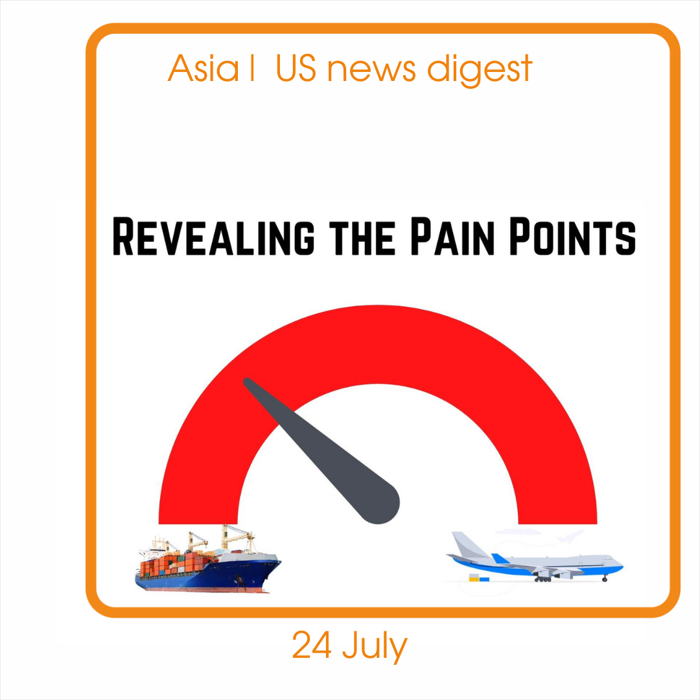Asia | US news digest. 24 July
The usual horsemen of the current crises (rates, congestion etc.) cannot be solely blamed for the challenging environment. In fact, they have only revealed the issues that used to be ignored for ages.
Union Pacific has announced the end of a temporary halt to rail shipments of international containers from the US west coast. The company hopes the new adjustments will allow the transportation supply chain to begin working off the backlog of Chicago destined trains while freeing up railcar assets to support import loading needs.
Determined to tackle the monopoly in the shipping industry and focused on the investigation of detention and demurrage, US Federal Maritime Commission is now requesting an increased budget to enable carrier audits. The checkups are supposed to inform additional rulemaking or enforcement, and more money is needed for specific specialists.
After Panamax boxship, prices for sought have doubled, commemorating one of the sharpest vessel appreciations recorded in the history of shipping. For instance, a small TEU that used to be evaluated for $20m, by the end of March was already $48m. The number of secondhand containership sales is up 780% for the year to date. The usual fellows of the crisis – congestion, shortages, and high rates – have also contributed to the splurge in values.
Hauiliers’ crisis is no only the pain point of the UK, but the US too. The current challenging context has revealed the problems that have been present for decades. Apparently, deregulation in the 1980s paved the way for a worsening driver shortage in America now, as hauliers struggling to recruit as a once “essentially American” industry lose their appeal. Drivers are also not satisfied with the pay, hours, and conditions overall. The situation has to be resolved urgently since the country needs to hire some 1.1m drivers over the next decade to stave off calamity in its supply chains.
The dynamic of constantly increasing customer demand and the rates not planning to decrease any time in the future have demonstrated the signs that this year’s peak season can be expected earlier. Moreover, it will most likely extend. There are now two main challenges: shippers are unable to get equipment or space to get their cargo out in time; and congestion. Therefore, forwarders urge shippers to book now for Christmas peak goods. Understanding where the wind is blowing, shippers, especially small and medium ones, start seeking collaboration and ways to improve practices, especially for SMEs, which are sensitive when they face huge alliances of major industry players. Another example of what companies are doing to become more agile is adjustments the fashion sector. Pandemic has made everyone reconsider their supplier relationships. In particular, fashion brands are consolidating their source base and focus on key suppliers.
The crisis has clearly shown that when there is disruption of one cogwheel, it is going to affect the rest of the mechanism. Shipping delays in Hong Kong are causing significant problems for local manufacturers, tying up millions of dollars in cash flow. Outbound shipments are currently delayed by three to five days, and carriers are skipping calls at the port. For intra-Asia shipments, carriers have implemented $100 port congestion surcharges for all inbound and outbound containers, excluding transhipment cargo.
Meanwhile, ocean carriers are requesting the use of their own trucking and customs brokerage services, as part of spot market offers for exports from China. They are also adding conditions to short-term rate offers. The current problems lie with the fact that demand is too hot and the backlog is too big. Due to congestion and closures because of COVID, cargo does not get shipped and thus, there are no payments.
Wan Hai Lines has authorized a US$1 billion budget for asset acquisition and disposal preparing its fleet expansion. The company is also awaiting the delivery of ships from CSSC Huangpu Wenchong Shipbuilding. However, the situation in Vietnam continues to be challenging due to the new COVID-19 outbreak.
Another log in the fire is a surge in oil prices that affects airfreight costs. The airlines themselves face a dilemma over fuel price hedging. By one estimate, this has reduced their average hedging exposure by 24%. Cathay Pacific was one of the airlines that got hit by hedges in 2020, but the carrier’s management eschews short-term action. Meanwhile, Chinese airfreight is facing flights cancelation due to pandemic lockdowns and poor weather.
US west coast port Los Angeles continues to report the increase in the number of handled containers. The data has shown a 27% year-on-year increase, closing its year at just under 11m TEU.
Hapag-Lloyd has announced rate increases to the East Coast of South America. It will apply a general rate increase of $500 per container for all cargo and container types
Panama Canal celebrates more than 100 years of shipping and commerce. Its latest expansion allows it to accommodate Neopanamax ships, which doubles the canal’s capacity.

